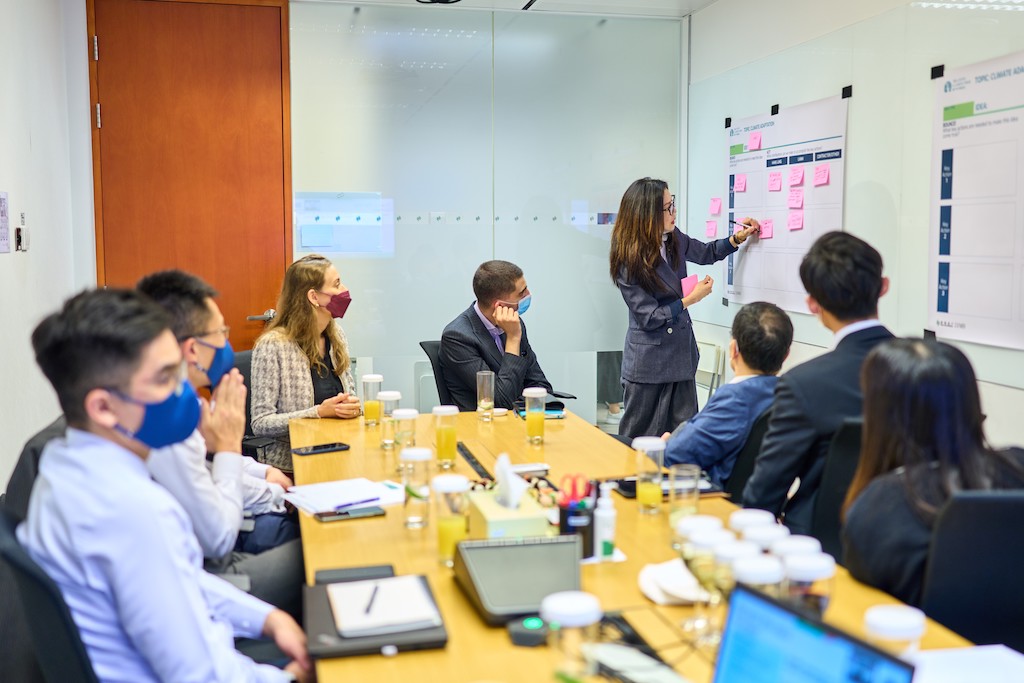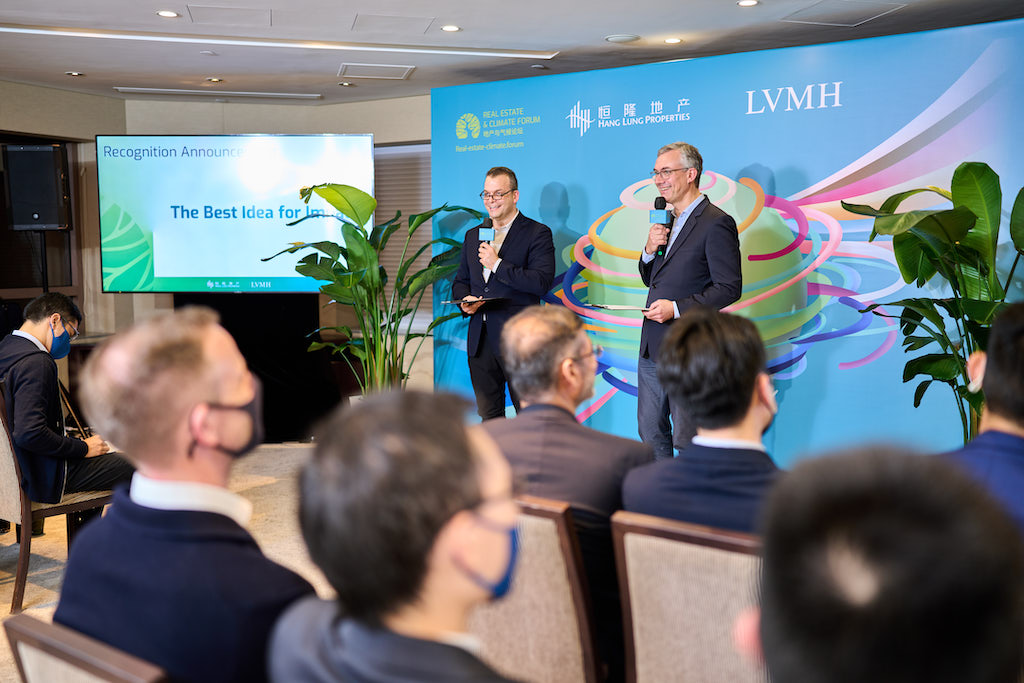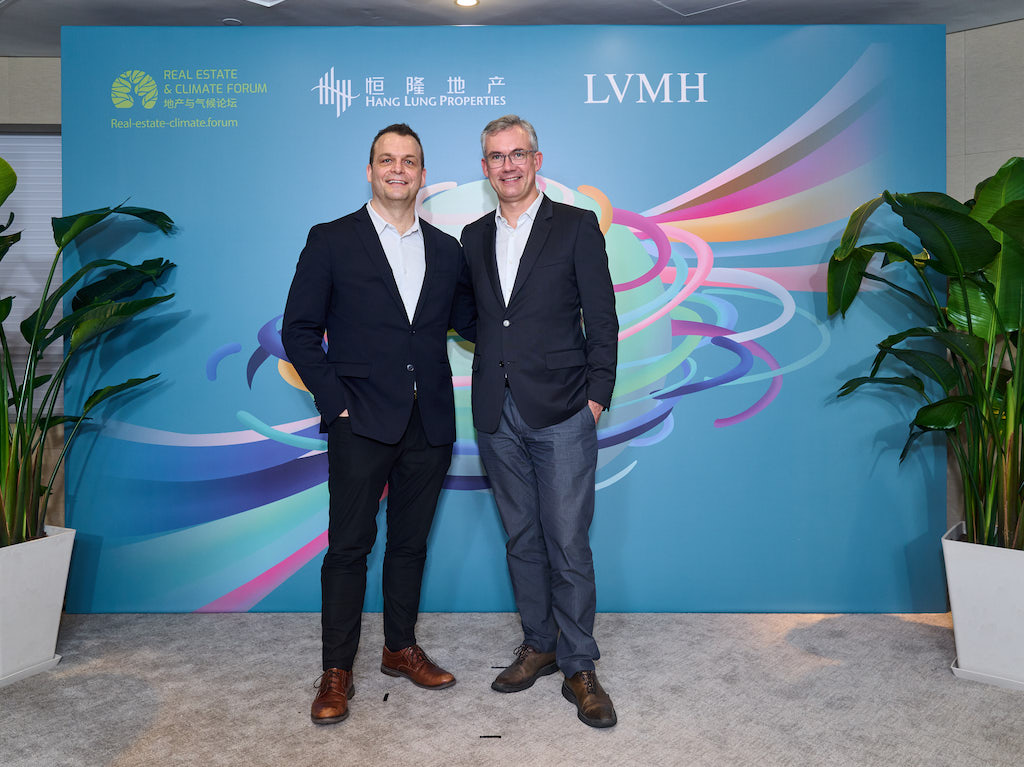Q+A w/ Hang Lung’s John Haffner & LVMH’s Nicolas Martin: ‘There’s This Sense Coming Out of COP27 That We Need To Do Things Faster And Differently.’
10 Mins Read
Hang Lung Properties’ John Haffner and LVMH’s Nicolas Martin, talk to Green Queen about their new climate and sustainability partnership.
Last month, Chinese real estate leader Hang Lung Properties and French luxury giant LVMH group announced a ground-breaking three-year climate and sustainability partnership. The collaboration, the first of its kind globally, looks to redefine the relationship between landlords and retail tenants, and includes collaboration in five areas: Climate Resilience, Resource Management, Wellbeing, Sustainable Transactions, and Sustainability Communication, Events and Progress Reviews.
Hang Lung Properties’ John Haffner, the company’s General Manager – Sustainability, and Nicolas Martin, LVMH Sustainable Store Planning Manager talk to Green Queen’s Sonalie Figueiras to share thoughts about the partnership, highlights from their recent inaugural Real Estate & Climate Forum, and what’s next.
Green Queen: Can you share more about the Hang Lung x LVMH partnership you just embarked on? What is so unique about it?
John Haffner: Sure. I think the partnership is unique in its scope, scale and depth. First, regarding the scope, we are covering a wide range of topics. We want to improve energy efficiency (as might be expected). But we are also asking, for instance, how we can do learning and development better together? How can we do social impact more effectively together? How can we think about biodiversity differently in the built environment?
Nicolas Martin: We covered 12 topics in our Forum, meaning that we are looking at all aspects of our stores’ operations within Hang Lung buildings.
John Haffner: The second is the scale. We’ve got 26 LVMH brands involved and over 90 retail stores in seven cities in mainland China. We’re talking about a lettable floor area of more than 27,000 square meters.
Nicolas Martin: This is a huge surface of stores, a large proportion of our luxury business.
John Haffner: But I think the most important feature of what makes it unique is the depth of our collaboration. And what I mean by that is we’re really, to use the language of LVMH, we’re co-creating solutions. So it’s not about the landlord saying to the tenant, ‘would you work on ABC’ or vice versa. There are some elements of that. But for the most part, we are sitting together and saying: ‘okay, how can we advance this agenda together’? We’re having the landlord and retail come together in a way that hasn’t been done in the past.
Green Queen: Absolutely, it’s not just between landlords and tenants, it’s at a much higher level than that.
John Haffner: You bring up a fourth aspect to this, which allows for those other three things to be taking place, and that is the level of organizational support. The fact that it’s Group-to-Group collaboration means that it’s not a landlord asking a specific tenant in a specific property to work on something. It’s two Groups coming together at that scale, with support for that scope, with support for that depth of collaboration. We’re not aware of another agreement like this at the group level, and neither is LVMH.

Green Queen: It is indeed unique. This partnership is really a first globally for real estate and retail. How do you see the possible impacts for both your respective industries? Is the plan to create a standard across the industry, both in real estate and in luxury retail?
John Haffner: One of the things that made this partnership exciting and fun is that we’re learning by doing. So we started with a lot of momentum and energy wanting to get going together first. But always the thought is, we want to expand beyond the two Groups later on. So now we’re thinking, what do we do a year from now?
We want to be able to collaborate with other tenants, other retail brands, other types of tenants, and LVMH wants to collaborate with other landlords. And both of us recognize that the old way of doing things hasn’t been adequate; we need to accelerate progress. Business as usual hasn’t been working. So there’s a sense of wanting to collaborate, and we are both committed to transparency with each other, I think the direction will be over time to share with others what we’ve also learned together, so you’re right, that could lead to ideas around standards, it could lead to ideas around knowledge sharing, and it could lead to ideas around good practices.
Nicolas Martin: With John, we believe that this is the way to do our part to fight against climate change. The issue we are all facing today is a systemic problem. Everything is linked together. So we need a systemic approach to fix the future together. Outside the measurable impacts of our concrete actions, I think that the most important is the design of this interaction. Our “open source” state of mind.
I feel that we are partnering for the good, not only for the business to be profitable.
Green Queen: Forging landlord-tenant relationships can be a challenge because everybody has their own interests, and then if you add shared sustainability values, that can add complexity, especially at this scale. Can you speak more about this?
John Haffner: I think we’re lucky as we have a long-standing relationship with LVMH. So I think there’s long-standing trust, which makes it easier to have an undertaking of this kind. And there’s a lot of transparency and sharing back and forth around what we’re thinking. And so this is relationship-driven, it’s driven by good relationships at the top.
I think the challenge is that we don’t have a template for what we’re doing, so we’re having to figure it out as we go. And I think it takes two organizations that are comfortable with a certain amount of ambiguity, a certain amount of discomfort.
The two Groups wasted no time and completed our Real Estate and Climate Forum just one month after our signing of the sustainability partnership. So I’d say the speed of execution in terms of organizing the Forum has been another challenge. And it’s only been possible, again, because of the trust of the two organizations and the top management support for the mandate. Without those two things, we wouldn’t have been able to do it at this speed for certain.
Green Queen: The Real Estate and Climate Forum was also quite innovative. Can you share some highlights from the event? Any major wins?
John Haffner: The Forum involved about 100 changemakers, 96, to be precise. So we had people in groups of eight engaging in discussions on 12 topics. And for each topic, we had four from each side, in a dedicated room with a facilitator discussing that topic. We nominated people that we thought would be appropriate for each conversation.
We set up a customized website, produced specifically for this Forum, where we asked all the changemakers to read learning content in their dedicated areas such as energy efficiency, water management, biodiversity, etc. prior to joining the Forum. Each of the changemakers also had to do a quiz to confirm that they had read the content.
Everybody had to go through the same process. We had some very senior people joining, such as leaders of various organizations, and they still had to do the reading and the quiz. We said to them: ‘Look, we know that you’re already an expert in this area. But we want to create a common baseline for everyone to have the same conversation, so if you’ll ’indulge us, please do the work as well.’ It was by mixing seniority levels, organizational backgrounds, and areas of expertise that we created this chemistry leading up to the Forum. Through this process, we collected more than 200 ideas. Out of those, we identified 36 for discussion in the Forum, which we further categorized into three areas- ideas for impact, ideas for collaboration, and ideas for innovation.
Nicolas Martin: The other feature of the Forum was that we didn’t focus on ‘the why,’ we focused on ‘the what’ and ‘the how.’ In our view, ‘the why there’s a need for more action around climate sustainability” is already very well established.
Another challenge we have now is managing and making sense of the large number of ideas we generated at the Forum – more than 200 altogether. And we will need to keep the momentum we generated with our beloved changemakers who contributed to the Forum.
John Haffner: It’s really been an amazing process to go into that kind of depth with another organization and to have both sides willing to engage in that kind of problem-solving together.

Green Queen: One of the topics property developers who are working on becoming more sustainable are exploring is this idea of a green lease. Is that part of this collaboration?
Nicolas Martin: Sure. A green lease is a set of obligations on sustainability for both sides, including not only targets, but an obligation of reporting and standardization of data.
The brands within LVMH may experience this as a kind of green lease at their level but the overall agreement is broader than that.
John Haffner: About a year ago, we started thinking in terms of green leases and we reached out to some of our strategic tenants and had exploratory conversations with them. And it just so happened that the counterpart that was most enthusiastic was from LVMH group. And by engaging with them at the Group level, it just went up a level from a specific lease – because they have multiple brands, and they’re trying to ensure common standards across their brands – to a wider scope.
The traditional green lease concept is based on the premise that maybe the landlord needs to motivate the tenant to do something on its side. This is a little bit different in that we’re really trying to shape solutions together. And we’re trying to figure out how to do things faster.
The accountability comes in by the fact that we’re sharing what we’re doing and learning, as in this interview.
So a year from now, we need to be able to show that we’ve made progress, that we’ve implemented certain actions against this effort together. We know that we’re going to need to be able to show data and results from this initiative.
Nicolas Martin: Without data, we cannot make any progress. So I think the green lease of the future sits also in data management.
Green Queen: Looking ahead, what’s next for this partnership? What are the big next steps?
John Haffner: We are going to be announcing the Common Charter in the first quarter of next year, which will be based on the 200 ideas we have received and the 36 ideas that were discussed in greater detail in the Forum.
We’re also going to think a year from now how we can repeat the success of the Forum and think about what worked well, what didn’t and what can we improve upon. The plan is to host the second edition of the Real Estate and Climate Forum in the fourth quarter of next year.
Nicolas Martin: I am looking forward to building our Common Charter with John. As I said this is a huge quantity of actions, and we will continue to refine our methods for managing these.
And we will look for ways through technology and events to maintain contact with our changemakers, our Maisons and suppliers, etc.
This is important to let them continue to feel a sense of ownership. Because they were authentically the authors of the good ideas that came out of our Forum!
Green Queen: Was there anything else that you wanted to add?
Nicolas Martin: Adriel Chan [Hang Lung’s Vice-Chair] spoke about the discomfort experienced by our changemakers as a good thing, and I loved that comment. It was the discomfort of trying a new approach. Because business-as-usual places us in danger, we have to be courageous.
John Haffner: We received a lot of good feedback from the participants as well, who commented on the depth of discussion and the substance, the focus on ideas and action in a way that they haven’t seen. So I think that’s quite exciting. And hopefully, we can model – with that example– a new approach that may help real estate and retail accelerate progress, because I think there’s this sense coming out of COP27 that we need to do things faster, we need to do things differently. So we’re kind of going through a ‘learning by doing’ process of figuring out how we can play our part to support that acceleration.
Nicolas Martin: Creating synergies like this will make truly exponential effects.
All images courtesy of Hang Lung Properties. Lead image: John Haffner, Hang Lung Properties General Manager – Sustainability and Nicolas Martin, LVMH Sustainable Store Planning Manager at the inaugural Real Estate and Climate Forum.
This is a Green Queen Partner Post.




